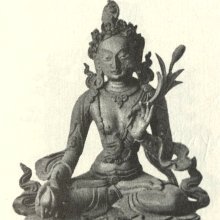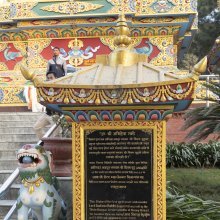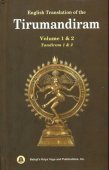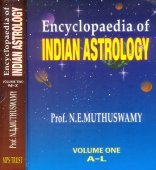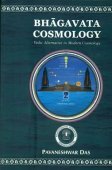Ai, Āī: 18 definitions
Introduction:
Ai means something in Hinduism, Sanskrit, the history of ancient India, Marathi, Jainism, Prakrit, Hindi, biology, Tamil. If you want to know the exact meaning, history, etymology or English translation of this term then check out the descriptions on this page. Add your comment or reference to a book if you want to contribute to this summary article.
Images (photo gallery)
In Hinduism
Vyakarana (Sanskrit grammar)
Source: Wikisource: A dictionary of Sanskrit grammarAi (ऐ).—Diphthong vowel ऐ; composite form of आ (ā) and ए (e), also termed वृद्धि (vṛddhi) in Pāṇini's grammar.

Vyakarana (व्याकरण, vyākaraṇa) refers to Sanskrit grammar and represents one of the six additional sciences (vedanga) to be studied along with the Vedas. Vyakarana concerns itself with the rules of Sanskrit grammar and linguistic analysis in order to establish the correct context of words and sentences.
Purana and Itihasa (epic history)
Source: archive.org: Puranic EncyclopediaAi (ऐ).—This diphthong means a female sage (yoginī) according to the Agni Purāṇa (Chapter 348 of Agni Purāṇa).

The Purana (पुराण, purāṇas) refers to Sanskrit literature preserving ancient India’s vast cultural history, including historical legends, religious ceremonies, various arts and sciences. The eighteen mahapuranas total over 400,000 shlokas (metrical couplets) and date to at least several centuries BCE.
India history and geography
Source: Shodhganga: A translation of Jhaverchand Meghanis non translated folk talesAi [Aai] refers to “Grandmother/ Goddess. In some caste grandma is addressed as Aai. Charni Woman is generally as goddess and she is called Aai”.—It is defined in the glossary attached to the study dealing with Gujarat Folk tales composed by Gujarati poet Jhaverchand Meghani (1896-1947)

The history of India traces the identification of countries, villages, towns and other regions of India, as well as mythology, zoology, royal dynasties, rulers, tribes, local festivities and traditions and regional languages. Ancient India enjoyed religious freedom and encourages the path of Dharma, a concept common to Buddhism, Hinduism, and Jainism.
Biology (plants and animals)
Source: Google Books: CRC World Dictionary (Regional names)Ai in India is the name of a plant defined with Chamaemelum nobile in various botanical sources. This page contains potential references in Ayurveda, modern medicine, and other folk traditions or local practices It has the synonym Anthemis nobilis L. (among others).
Example references for further research on medicinal uses or toxicity (see latin names for full list):
· Species Plantarum (1753)
· Flora Pedemontana (1785)
If you are looking for specific details regarding Ai, for example pregnancy safety, diet and recipes, health benefits, extract dosage, side effects, chemical composition, have a look at these references.

This sections includes definitions from the five kingdoms of living things: Animals, Plants, Fungi, Protists and Monera. It will include both the official binomial nomenclature (scientific names usually in Latin) as well as regional spellings and variants.
Languages of India and abroad
Marathi-English dictionary
Source: DDSA: The Molesworth Marathi and English Dictionaryāī (आई).—f (ambā S) A mother. 2 A term of fondness for an infant. āīcēṃ dūdha kīṃ gāyīcēṃ dūdha Used where two courses of action are presented, so similar as to preclude preference or rejection. āījīcyā dōndāvara bāījī udāra Used where one person is generous upon the property of another. ā0 jēvūṃ ghālīnā bāpa bhīka māgūṃ dēīnā Expresses a dilemma or strait; pressure betwixt two difficulties or two authorities. āī tī guravīṇa hōīna naivēdya khāīna Used of an idle female of a household forward enough to devour the prepared meal; a female drone. ēkā āīcīṃ lēṅkarēṃ (Children of one mother.) A term expressing Fraternity or Brotherhood.
--- OR ---
ai (ऐ).—The ninth vowel; corresponding with Ei in height. It is properly a diphthong. It is, in this work, represented by Ai.
Source: DDSA: The Aryabhusan school dictionary, Marathi-Englishāī (आई).—f A mother. āījīcyā dōndāvara bāījī udāra. Used where one person is gener- ous upon the property of another. āī jēṃvū ghālīnā, bāpa bhīka māgū dēīnā A fix, a di- lemma; betwixt two difficulties.
--- OR ---
ai (ऐ).—The twelfth vowel.
Marathi is an Indo-European language having over 70 million native speakers people in (predominantly) Maharashtra India. Marathi, like many other Indo-Aryan languages, evolved from early forms of Prakrit, which itself is a subset of Sanskrit, one of the most ancient languages of the world.
Sanskrit dictionary
Source: DDSA: The practical Sanskrit-English dictionaryAi (ऐ).—(nipāto'bhimukhīkaraṇe) An interjection to attract attention; ऐ वाचं देहि (ai vācaṃ dehi) ...... Bhaṭṭikāvya 6.18.
--- OR ---
Ai (ऐ).—m. Name of Śiva. -ind. An interjection of (1) calling (= Hallo, ho); (2) remembrance; (3) inviting. cf. also ऐः क्रूरो धरणीनाथः पूरो मारोऽमरोऽसुरः । कुलालो राधरः प्राज्ञो मन्दः पुत्रोऽथवा नरः (aiḥ krūro dharaṇīnāthaḥ pūro māro'maro'suraḥ | kulālo rādharaḥ prājño mandaḥ putro'thavā naraḥ) || Enm.
Derivable forms: aiḥ (ऐः).
Source: Cologne Digital Sanskrit Dictionaries: Shabda-Sagara Sanskrit-English DictionaryAi (ऐ).—The twelfth vowel of the Nagari alphabet, or more properly a diphthong; corresponding in sound to Ei in height.
--- OR ---
Ai (ऐ).—ind. An interjection of, 1. Remembering, (aye, ha) 2. Calling, summoning, (hola, ho, heigh.)
--- OR ---
Ai (ऐ).—m. (aiḥ) A name of Siva.
Source: Cologne Digital Sanskrit Dictionaries: Cappeller Sanskrit-English DictionaryAi (ऐ).—interj.
Source: Cologne Digital Sanskrit Dictionaries: Monier-Williams Sanskrit-English Dictionary1) Ai (ऐ):—1. ai the twelfth vowel of the alphabet and having the sound of ei in height.
2) 2. ai ind. an interjection, [Maitrāyaṇī-saṃhitā]
3) a particle of addressing
4) summoning
5) remembering, [cf. Lexicographers, esp. such as amarasiṃha, halāyudha, hemacandra, etc.]
6) 3. ai m. Name of Śiva, [cf. Lexicographers, esp. such as amarasiṃha, halāyudha, hemacandra, etc.]
Source: Cologne Digital Sanskrit Dictionaries: Yates Sanskrit-English Dictionary1) Ai (ऐ):—The 12th vowel of the alphabet, sounded like e i in heighth.
2) Interj. ha! ho, heigh.
3) (aiḥ) 4. m. A name of Shiva.
[Sanskrit to German]
Sanskrit, also spelled संस्कृतम् (saṃskṛtam), is an ancient language of India commonly seen as the grandmother of the Indo-European language family (even English!). Closely allied with Prakrit and Pali, Sanskrit is more exhaustive in both grammar and terms and has the most extensive collection of literature in the world, greatly surpassing its sister-languages Greek and Latin.
Hindi dictionary
Source: DDSA: A practical Hindi-English dictionaryAi (ऐ) [Also spelled ee]:——the eighth vowel and the eighth letter of modern Devnagri: alphabet. (If [ṛ] (ri) and [lṛ] (lri) are also to be taken into account, it becomes the tenth); O!, a vocative; just listen !
...
Prakrit-English dictionary
Source: DDSA: Paia-sadda-mahannavo; a comprehensive Prakrit Hindi dictionary1) Ai (ऐ) in the Prakrit language is related to the Sanskrit word: Ayi.
2) Ai (ऐ) also relates to the Sanskrit word: Ati.
3) Ai (ऐ) also relates to the Sanskrit word: Ati.
4) Ai (ऐ) also relates to the Sanskrit word: E.
5) Aī (अई) also relates to the Sanskrit word: Gama.
6) Āi (आइ) also relates to the Sanskrit word: Adā.
7) Āi (आइ) also relates to the Sanskrit word: Ādi.
8) Āi (आइ) also relates to the Sanskrit word: Ādin.
9) Āi (आइ) also relates to the Sanskrit word: Āji.
10) Ai (ऐ) also relates to the Sanskrit word: Ayi.
Prakrit is an ancient language closely associated with both Pali and Sanskrit. Jain literature is often composed in this language or sub-dialects, such as the Agamas and their commentaries which are written in Ardhamagadhi and Maharashtri Prakrit. The earliest extant texts can be dated to as early as the 4th century BCE although core portions might be older.
Kannada-English dictionary
Source: Alar: Kannada-English corpusAi (ಐ):—[noun] the eleventh letter of the Kannaḍa alphabet ( a union of two vowels 'ಅ' and 'ಏ', pronounced in one syllable).
--- OR ---
Ai (ಐ):—[noun] a prefix to denote the number 'five'.
Kannada is a Dravidian language (as opposed to the Indo-European language family) mainly spoken in the southwestern region of India.
Tamil dictionary
Source: DDSA: University of Madras: Tamil LexiconAi (ஐ) . Ninth letter and vowel of the Tamil alphabet, diphthong of a and i; ஒன்பதாம் உயி ரெழுத்து. [onpatham uyi rezhuthu.]
--- OR ---
Ai (ஐ) particle
1. Suff. of nouns formed from verbs to express (a) that which does an action, as in பறவை; வினைமுதற் பொருள் விகுதி [paravai; vinaimuthar porul viguthi]: (b) that which is acted upon, as in தொடை; செயப்படு பொருள் விகுதி [thodai; seyappadu porul viguthi]: (c) the instrument, as in பார் வை; கருவிப்பொருல் விகுதி. [par vai; karuvipporul viguthi.] (நன். [nan.] 140, உரை. [urai.])
2. Suff. of verbal nouns, as in கொலை; தொழிற்பெ யர் விகுதி. [kolai; thozhirpe yar viguthi.]
3. Suff. of abstract nouns, as in தொல்லை; பண்புப்பெயர் விகுதி. [thollai; panpuppeyar viguthi.] (நன். [nan.] 140, உரை. [urai.])
4. Accusative case-ending; இரண்டாம் வேற்று மை யுருபு. [irandam verru mai yurupu.] (நன். [nan.] 296.)
5. Ending of 2nd person singular verb, as in சென்றனை; முன்னிலை யொருமை விகுதி. [senranai; munnilai yorumai viguthi.] (நன். [nan.] 140, உரை. [urai.])
6. A euphonic augment, as in பண்டைக்காலம்; ஒரு சாரியை. [pandaikkalam; oru sariyai.] (நன். [nan.] 185, உரை. [urai.])
--- OR ---
Ai (ஐ) noun
1. Wonder, astonishment: வியப்பு. ஐதே யம்ம யானே [viyappu. aithe yamma yane] (தொல். சொல். [thol. sol.] 385, உரை [urai]).
2. Beauty; அழகு. (பிங்கலகண்டு) [azhagu. (pingalagandu)]
3. Slenderness; மென்மை. ஐதுவீ ழிகுபெயல் [menmai. aithuvi zhigupeyal] (பத்துப்பாட்டு [pathuppattu] 13).
4. Minuteness, subtleness; நுண்மை. அணுத்தருந் தன்மையி லையோன் [nunmai. anutharun thanmaiyi laiyon] (திருவாசகம் [thiruvasagam] 3, 45).
5. Phlegm; கோழை. ஐயினான் மிடறடைப் புண்டு [kozhai. aiyinan midaradaip pundu] (தேவாரம் [thevaram] 812, 7).
6. Bronchitis; கபவியாத. ஐம்முதற் பிணியினா லழுங்கி [kapaviyatha. aimmuthar piniyina lazhungi] (மகாபாரதம் குருகுல. [magaparatham kurugula.] 22).
7. The fifth note of the gamut; இளியென்னும் ஐந்தாம் இசையின் எழுத்து. (திவா.) [iliyennum aintham isaiyin ezhuthu. (thiva.)]
8. Lord, master; தலைவன். என்னைமுன் னில்லன்மின் [thalaivan. ennaimun nillanmin] (திருக்குறள் [thirukkural], 771).
9. Husband; கணவன். எனக்கு மாகா தென்னைக்கு முதவாது [kanavan. enakku maga thennaikku muthavathu] (குறுந்தொகை [kurundogai] 27).
10. King; அரசன். (சூடாமணிநிகண்டு) [arasan. (sudamaninigandu)]
11. Guru, priest, teacher; ஆசான். (அகராதி நிகண்டு) [asan. (agarathi nigandu)]
12. Father; பிதா. தன்னை சேவடித் தாமரை [pitha. thannai sevadith thamarai] (சீகாளத்தி புராணம் நான்முக. [sigalathi puranam nanmuga.] 124).
13. A prepared arsenic; சவ்வீர பாஷாணம். (தைலவருக்கச்சுருக்கம் தைல.) [savvira pashanam. (thailavarukkachurukkam thaila.)]
--- OR ---
Ai (ஐ) noun ((சங்கத்தகராதி) தமிழ்சொல்லகராதி) [((sangathagarathi) thamizhsollagarathi)]
1. cf. ஐயவி. [aiyavi.] Indian mustard; கடுகு. [kadugu.]
2. Sugar; சர்க்கரை. [sarkkarai.]
Tamil is an ancient language of India from the Dravidian family spoken by roughly 250 million people mainly in southern India and Sri Lanka.
See also (Relevant definitions)
Starts with (+1109): Ai cha biao zi, Ai di yu, Ai hao, Ai hui mao dou, Ai jiao suan pan zi, Ai kang, Ai kelane, Ai kor, Ai kori, Ai lao guan cao, Ai lau salak, Ai lek mai phai, Ai ma huang, Ai masi, Ai na hsiang, Ai na xiang, Ai nitu, Ai oi, Ai pue, Ai qian jin ba.
Ends with (+9980): A-cupakiriyai, A-cuttamayai, A-kamavinai, A-karaicimai, A-kucalavetanai, A-yacitapiccai, Aa-kaa-kai, Aadaathodai, Aadalai adalai, Aadutheendaapalai, Aadutheendaappaalai, Aadutheendapalai, Aaduthinnapalai, Aafai, Aakayatamarai, Aalividai, Aanai katralai, Aaraikeerai, Aarakeerai, Aarakkerai.
Full-text (+1164): Aikara, Vilaksha, Vilakshatva, Lakshya, Nimitta, Airina, Ainapaina, Aincana, Asamdhana, Tatparya, Aisapaisa, Siddhartha, Lakshata, Karyavastu, Purushartha, Arthavipatti, Sharavya, Samavasarana, Aim, Adi.
Relevant text
One of your search terms exceeds the minimun character amount per search term. This amount currently equals 2.
No search results for Ai, Āī, Aī, Āi, Aai; (plurals include: Aais) in any book or story.
Related products
(+4 more products available)


